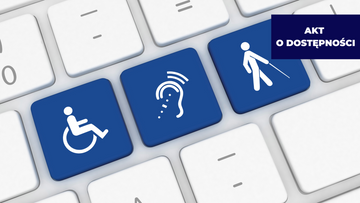What will 2025 bring for the e-commerce sector? Part 1: New regulations: GPSR, EAA, AI ACT
by Marcin Tomczak on Dec 23, 2024
Dynamics of legal changes in the e-commerce sector in Poland and the European Union in 2024
In 2024, we will see extremely dynamic changes and legal innovations that directly impact the e-commerce sector in Poland and the entire European Union. These transformations go beyond standard updates and include the introduction of new requirements that shape not only the internal market but also the flow of goods and services across the EU.
On the one hand, the new regulations aim to strengthen consumer protection and ensure full transparency and security of online transactions. EU and national authorities aim to minimize risks for consumers and create consistent standards for product safety and the accessibility of digital services, applicable across the EU.
On the other hand, these changes contribute to the increased responsibility that entrepreneurs, including those operating in the e-commerce industry, must assume. The need to ensure compliance with increasingly detailed legal requirements and adapt operations to new standards poses a significant challenge. Entrepreneurs must now prioritize the transparency of their sales processes, accountability for the safety of their products, and protection of consumer rights, which includes implementing complex internal procedures and utilizing technologies that facilitate compliance monitoring.
An example of such regulations is the General Product Safety Regulation (GPSR), which introduces new standards for product safety and quality management, particularly in the context of online transactions and cross-border trade. The European Accessibility Act, in turn, aims to increase the accessibility of digital e-commerce services to people with disabilities, requiring the implementation of numerous technical improvements on websites and mobile applications. Another key regulation is the Artificial Intelligence Act, which imposes requirements for the transparency and ethical use of recommendation algorithms, sales process automation, and consumer behavior analysis. You can read more about these regulations in the following sections of this article.
These legal initiatives are just one part of a broader process of harmonizing rules and standards across the EU market, and their impact will be particularly visible in 2025. With increasing oversight and expanded control mechanisms, businesses will have to face new challenges, including the need to invest in compliance monitoring technologies and train employees in updated legal procedures.
New regulations affecting e-commerce in Poland and the EU
General Product Safety Regulation (GPSR)
On December 13, 2024, Regulation (EU) 2023/988 of the European Parliament and of the Council, known as GPSR, will enter into force, replacing Directive 2001/95/EC. The new regulations aim to improve the safety of consumer products in the European Union, particularly in the context of growing online trade and digital technologies. The GPSR aims to facilitate the identification of responsible entities in the supply chain and streamline the process of withdrawing unsafe products from the market.
The Regulation covers the vast majority of non-food consumer products placed on the EU market, including new, used, repaired and refurbished goods.
The GPSR introduces a series of obligations for manufacturers, importers, distributors, and e-commerce sellers, who must ensure that products meet safety standards and are properly documented. Sellers, including online sellers, must ensure their offers comply with product safety information requirements and cooperate with regulatory authorities.
You can read more about GPSR in the article we prepared, available at this address .
European Accessibility Act:
The European Accessibility Act (EAA) is an EU regulation adopted in 2019 aimed at improving the accessibility of products and services for people with disabilities, including in the digital environment. In Poland, it was implemented through the Act on Ensuring Compliance with Accessibility Requirements by Businesses.
The law imposes new obligations on online store owners, who must adapt their platforms to the needs of people with disabilities. This includes:
- functions such as font enlargement, contrasting backgrounds, alternative content formats (audio descriptions, subtitles),
- ensuring the availability of the purchase, complaints, returns and delivery process.
All information on websites must be readable by assistive technologies (e.g., screen readers). Failure to do so may result in financial penalties and loss of competitiveness.
The provisions of the Act will enter into force on 28 June 2025.
AI Act :
The AI Act, or the Regulation on Artificial Intelligence, introduces regulations aimed at the safe and responsible use of AI technology and minimizing the risks associated with its use, especially in terms of the rights of citizens and consumers.
The regulations impose obligations on AI model providers, including e-commerce companies, where AI is used to personalize offers, analyze data, and automate processes. Key requirements include:
- conducting an AI risk assessment,
- monitoring AI systems after their implementation,
- ensuring the transparency of algorithms and eliminating prejudice and discrimination,
- implementing safeguards against errors and abuse.
Companies must provide users and authorities with insight into AI decision-making processes, especially where they impact consumer rights (e.g., complaints processes).
Failure to comply with the AI Act's requirements may result in severe sanctions, including significant financial penalties. These new obligations are particularly significant in e-commerce, where AI will play an increasingly important role in data analysis and sales automation.
Summary
In 2025, the e-commerce sector in Poland and the EU will face significant challenges related to new legal regulations such as the GPSR , the European Accessibility Act (EAA) , and the AI Act . These regulations aim to improve product safety, ensure the accessibility of digital services to people with disabilities, and ensure the responsible use of artificial intelligence technologies.
For businesses, this means adapting their operations to new standards, including ensuring compliance with security standards, algorithm transparency, and online content accessibility. Failure to implement appropriate changes risks financial penalties and loss of competitiveness.
New regulations and increased controls by supervisory authorities such as the Office of Competition and Consumer Protection and the Polish Chamber of Commerce make preparing companies for the upcoming changes crucial for their further development in the e-commerce market.
Want to learn more about the new regulations? Contact us!





